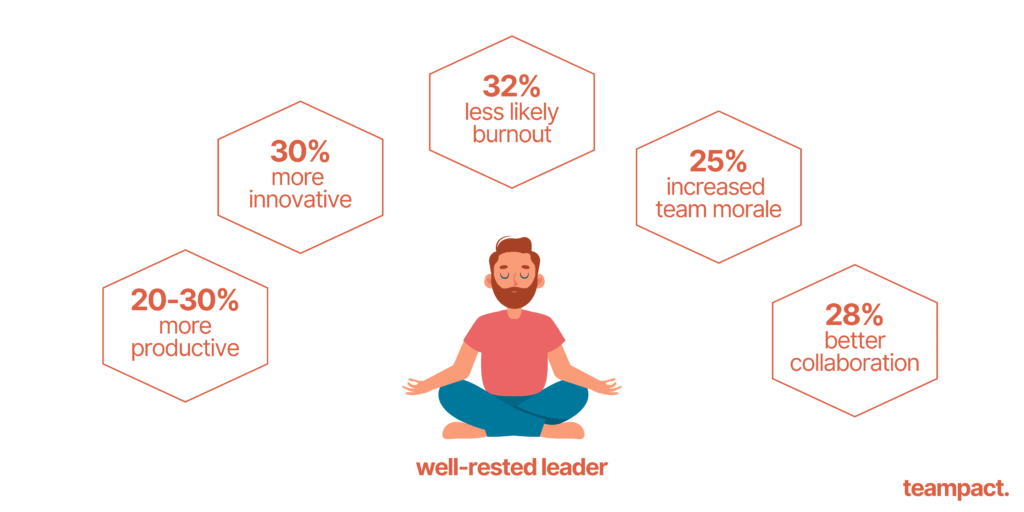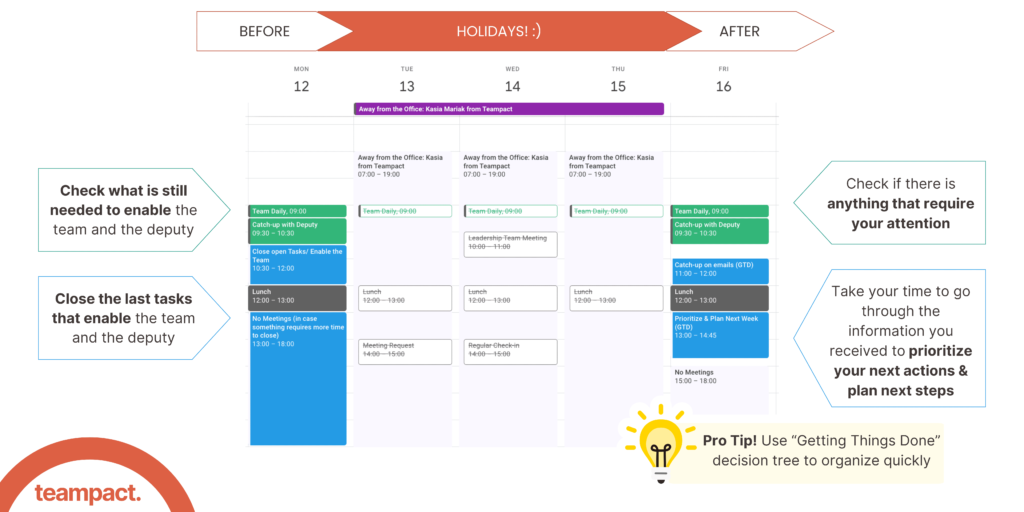Let’s talk about holidays!
Today you will learn five steps that will help you to prepare your holidays in a way that you will really enjoy them instead of feeling guilt and anxiety.
I recently went for a short trip to Morocco with my husband. We were there for only 4 days. When these four days finished we looked at each other and shared the same observation: “We were much more relaxed than after many of our other trips which lasted longer!”
As we really wanted to understand how that happened, we started to list things that we did differently this time.

As we both work remotely, we often book a place near a beach or in the mountains to change the scenery, relax, or do something different.
The problem is that we keep making the same mistakes, which you are likely to do as well:
- We take random days off, so some weeks we work Monday, Wednesday, and Friday, but not Tuesday or Thursday. Yes, we still think about work on Tuesdays and Thursdays
- We check our mailboxes, because we think it will be easier to start the working day
- We talk about work and keep trying to solve the challenges we have
- We allow our colleagues to reach out to us (like we are the heroes or something 🙂)
- We sometimes overcommit before the holidays and we want to catch up
How many of you do the same?
Despite doing many things we enjoy (especially sports and trying new foods :)), we still feel exhausted when we get home. You can see it in the conversations we have the next day after we go to work. We seem to be more frustrated than calm.
Instead, Morocco gave us something completely different:
- a huge energy boost
- new perspectives on many things
- gratitude for what we have
- reduced stressed which resulted in more calm, constructive and inspiring talks with our teams after
This is in line with the research that has linked the effectiveness of leaders to their ability to rest and care for themselves.

So what did we do about our Morocco trip differently?
Let me share with you the secret! We prepared it with the objective to not be needed!
We prepared it in such a way that we could really forget about the work and not feel guilty about it!
Here are the few tips that really work. Use them BEFORE you go on holidays.
1. Set and Secure Your Time Off Early
Imagine this: You’re looking at your calendar, and it’s packed with meetings, deadlines, and tasks. The thought of squeezing in a vacation seems impossible. But taking that first step—blocking off your vacation dates—can be incredibly liberating.
- Block Your Calendar: As soon as you decide on your vacation dates, block them off on your calendar. This not only gives your team and stakeholders plenty of notice but also mentally prepares you for the break.
- Leverage Slow Periods: If your company has natural slow periods, try to schedule your vacation during these times. It’s easier to relax knowing that there’s less critical work being missed.
- Create Team-Wide Downtime: If possible, coordinate with your team to establish a slow period for everyone. This collective downtime minimises the impact of your absence and fosters a culture of rest and rejuvenation.
2. Communicate with Your Team
Leaders often carry the weight of the world on their shoulders, feeling that the team’s success depends solely on them. But sharing your plans and delegating responsibilities can transform your team’s dynamic.
- Share Your Plans: Be open with your team about your vacation plans and the importance of taking a break to recharge. This transparency encourages them to do the same and prepares them for your absence.
- Prepare for Continuity: Discuss with your team how they can manage without you. Share what you usually do and check who wants to take specific responsibilities.
- Encourage Team Autonomy: Empower your team members by assigning someone to step into your role temporarily. This can be a great development opportunity for them and provide you with peace of mind.
3. Appoint a Deputy
- Choose Wisely: Select a reliable and motivated team member to act as your deputy. This person should be capable of making decisions in your absence and handling any urgent issues that arise. If you work with your team members regularly on their development and your succession plan, you know who is the most motivated and you can help her/him prepare even better.
- Provide Clear Guidance: Ensure your deputy understands their responsibilities and has all the information they need to manage effectively. Give them freedom to do it their way.
- Trust and Let Go: Trust your deputy to handle things their way. Use this as a learning opportunity to see if some tasks can be done differently—and possibly better—than you would do them.
4. Manage Stakeholder Expectations
Communicating with stakeholders is crucial to a guilt-free vacation. It’s about setting boundaries and managing expectations.
- Proactive Communication: Inform key stakeholders about your upcoming vacation well in advance. Clearly outline who will be handling your responsibilities and how they can get support during your absence.
- Set Boundaries: Avoid overcommitting before your vacation. Clearly communicate that you will not be taking on new projects or responsibilities just before or during your time off.
- Introduce Your Deputy: Gradually introduce your deputy to stakeholders, allowing them to build trust and understanding. This ensures a smooth transition during your absence.
5. Prepare Your Calendar and Autoresponder
- Pre- and Post-Vacation Buffers: Block off the day before and the day after your vacation. The day before helps you wrap up loose ends and avoid last-minute meetings, while the day after gives you time to catch up and reorient yourself without stress.

By following these steps, you can reduce the anxiety and guilt often associated with taking a vacation.
Remember, effective leaders recognize the importance of self-care and rest, not just for themselves but for the well-being and productivity of their teams.
Interesting Resources about Rest & Productivity
- HBR: The Research Is Clear: Long Hours Backfire for People and for Companies by Sarah Green Carmichael
- HBR: Working Too Hard Makes Leading More Difficult by by Ron Friedman
- Forbes: The Undeniable Link Between Well-Being And Productivity by Andrew DeutscherThe Undeniable Link Between Well-Being And Productivity by Andrew Deutscher
Coming up next: How to Rest Effectively
In our next article, we will explore:
- Different types of rest and how to balance them.
- Activities to avoid during your vacation to ensure you return truly rested and rejuvenated.
Taking these steps will help you make the most of your time off, ensuring you return to work energised and ready to lead with renewed vigour.
Enjoy your journey and take care of yourself!
I believe you have the power inside you to make the change you want to see!
Kasia from Teampact

